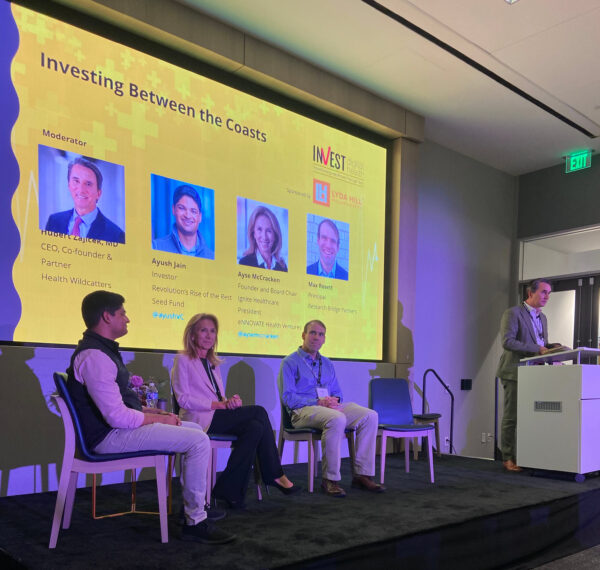
From left: Ayush Jain of Revolution’s Rise of the Rest Seed Fund; Ayse McCracken of Ignite Healthcare and INNOVATE Health Ventures; Max Rosett of Research Bridge Partners; and Dr. Hubert Zajicek of Health Wildcatters
When it comes to investment, including healthcare and biotech, companies in the Bay area, Boston and New York tend to get the lion’s share of venture capital. But in recent years there’s been greater attention to investment in companies beyond those regions. The Covid-19 pandemic also played a significant role, as people were forced to limit travel and use Zoom to connect. In a panel discussion at INVEST Digital Health, healthcare and life science investors discussed investment strategies and why they are placing their funding bets in states like Texas, Indiana, Utah and Arkansas.
The panel, Investing between the coasts, moderated by Dr. Hubert Zajicek, CEO, partner and co-founder of Health Wildcatters, offered a window into how investors are finding companies that match their investment theses, even in states that are not thought of as startup hubs. The panel was sponsored by Lyda Hill Philanthropies.
“We were the most active investor in Arkansas last year,” said Ayush Jain, a senior associate with Revolution’s Rise of the Rest Seed Fund. The fund, which was started by Steve Case of AOL fame, has made investments in more than 200 companies in 40 states since 2017.
The video platform Zoom has made an indelible impact towards democratizing investment across the country, according to Ayse McCracken, a founder and board chair with Ignite Healthcare in Houston and president of eNNOVATE Health Ventures. Ignite focuses on women-led digital health and medical device startups, while eNNOVATE invests in a broad array of startups across the continent of Africa.
McCracken said it was one of the unintended consequences of the pandemic.
“[Zoom] has allowed us to connect with entrepreneurs all across the country and all across the world and match them with mentors across the U.S. All of a sudden, we were working with an expanded ecosystem coast to coast, and we were working with startups coming from all across the country. We have eight of the 22 companies [in our latest cohort] that are coming from the Texas market — San Antonio, Austin, Dallas and Houston, which is great. We’d love to see Texas continue to grow. Denver has been another location where we’re seeing a number of entrepreneurs come from, also Minneapolis.”
Max Rosett, a principal with Research Bridge Partners, conceded that Zoom has been useful for connecting with and keeping in touch with portfolio companies in areas that would have otherwise been costly to travel to from his offices in Salt Lake City.
“This is going to sound incredibly trite and yet it’s incredibly real. Now that it’s okay to have board meetings over Zoom, life is much easier,” Rosett said.
Research Bridge Partners, which focuses on life science companies, is trying to chip away at what it refers to on its website as the “geographic misalignment” of venture capital in the Bay area and Boston. It also calls attention to trends among larger venture capital firms of creating lab-to-market systems to advance ideas towards financial liquidity that make it tougher for midcontinent principal investigators to access, because these firms favor institutional brand and geographical proximity to their offices.
Although everyone is pleased that the worst of the pandemic appears to be over, Zajicek said that in the past two years the accelerator has received a record number of applications from all over the world, which has spurred the development of a hybrid program combining in-person and Zoom-based interactions with startups in its cohorts. It has added an international flavor to its startup portfolio. Add to that the accelerator’s advantageous base in Dallas, in close proximity to an airport with the most direct flights in the country.
“It has flattened the world in non-trivial ways,” Zajicek said.
Health Wildcatters recently moved its offices to Pegasus Park, a 13-floor building that offers lots of space for healthcare and life science startups to work and connect with investors and collaboration partners.
Jain agreed that Zoom can offer a useful complement to in-person meetings and has made it easier to foster relationships with startups. He emphasized the importance of regional startup incubator and accelerator spaces, which frequently host demo days and other events to bring investors and startups together. They can also prove useful for investors from out of town seeking to plug into the regional startup ecosystem.
“If there’s a city that you gravitate towards, whether it’s because of a particular industry strength, or a personal connection, those are factors to leverage when you build relationships in those cities and find deal flow there,” Jain said. “That’s something we lean on a lot. We’re not lead investors. So we rely on finding opportunities to invest in startups, mostly through local regional investors, accelerators, incubators, places like Pegasus Park, where there’s a ton of companies. There’s some institutions in other cities like this. I think finding those and really honing in on them and building relationships is important.”












